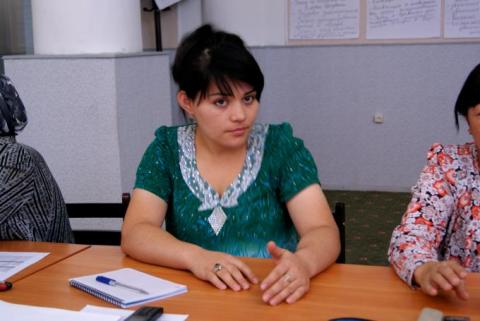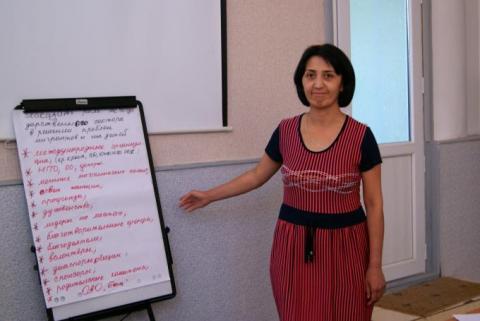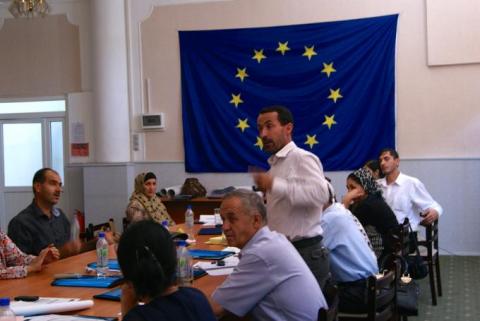Building the competences of our staff and service providers to improve protection and living conditions of children of migrant families
“During my years in schools and my five years of university I studied a lot but here, in five days, I learnt more useful things than my years in university!” says Fatima Gulieva, 32, during a break from the training of trainers (ToT) on child rights and child protection organized by Save the Children in August 2014, in the framework of the EU funded project “Addressing negative economic and social consequences of labour migration through the Enhancement of Protection Services of Families and Children of Migrants Left Behind in Tajikistan”.

Fatima is a young and enthusiastic income-generating specialist at Save the Children in Kulob area, where she supports female heads of families to better use their income. Together with other staff members of Save the Children, the local NGO Child Rights Centre, and of the Migration Support Centres, she received training on child protection, child-to-child education, assessment and identification of vulnerable families, as well as national and international norms and principles regulating child protection and social services to vulnerable population of the country.
“With this training, I understood that in Tajikistan, children as rights holders, do not have a clear perception of what their rights are. People think that families of migrants workers have only economic problems, but the main problem is that families don’t know their children’s rights so they cannot claim them” said Mustahon Lakhobov, 40, a employee of one of the service providers that are working in the Migration Support Centres in Tojikobod district.
In Tajikistan, migration increases the vulnerability of children, especially of children from the poorest households or whose parents have decided to abandon their families in Tajikistan and start a new family abroad. A research conducted by Save the Children in 2011 demonstrated that children from abandoned families performed less well in school and were more likely to work in the household, small trade or in the field rather than attend non-compulsory education. Additionally, children from migrant families showed a tendency to become withdrawn and depressed.
The ToT sessions used interactive methodologies and the trainers were adjusting the contents to the specific features of migration. “Participants are bringing up their experiences and I try to adjust my sessions, integrating what is more relevant for migration and for the districts where the participants are working” explained Shamsya Mirgayosieva, one of the trainer of the Child Rights Centre.

The trainings were also a good opportunity to share experiences among people working in different districts after six months since the start of the project: “We are synchronizing the activities of the service providers at district level by constantly communicating with each other. There are common issues in every district, but also some specific features. We need to find these common issues and work together” explained Shamsya underlining that her role was not only to be a trainer, but also to facilitate the exchange of information among different districts.
The ToT session on child rights and child protection increased the competences of Save the Children and staff of the Migration Support Centres, as a first step to improve the protection services for children of migrant families. “Now, I have the details on legislative framework for child protection that I am definitely going to use those for my work. Every topic we faced during the training is useful for my job here at Save the Children, especially on rights of children and migrants”, Fatima said. In the upcoming months, the participants will conduct workshops on those topics for practicioners at district level, for school children and families, in order to enable the system provide effective and child-centered responses to the needs and constraints of children and families affected by migration.
“When I am back to work in Tojikobod, I will concentrate on families, doing advocacy for children’s rights not only in schools, but also in the families because they are the main duty bears”, concluded Mustahon, emphasizing that he feels he can now better advocate for childs’ rights within schools and families. By improving the service provision systems and referral systems the EU funded project supports those caring for children left behind and will raise the awareness of duty bearers, service providers and families with regard to a protective package for such children.

 Central Asia
Central Asia